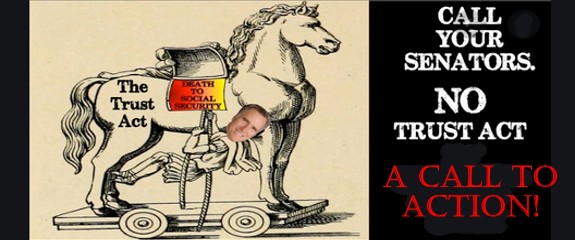As lawmakers in Federal Government often do, they came up with an inappropriate acronym for a devilish piece of legislation called, the TRUST Act.
During the February 5, 2021 debate on Senate budget resolution, the Senate voted 71-29 in favor of an amendment to potentially pave the way for Social Security and Medicare “Rescue Committees.”
Senator Mitt Romney (UT) offered the amendment. It is based on a bill he introduced with Representative Mike Gallagher (WI) during the last Congress, the Time to Rescue the United States Trusts (TRUST) Act, S. 2733 and H.R. 4907.
Although this amendment could not be included in the COVID Relief bill, the TRUST Act itself is a threat to the retirement security of millions of Americans.
The TRUST Act is not to be trusted.
Within it lies the ability for committees to be created that can determine cuts to Social Security benefits. The so-called “Rescue Committees” will have 12 members, appointed by the House Speaker and Minority Leader and the Senate Majority and Minority Leaders. Their deliberations would not include public hearings or input.
The committees can consider dramatic changes to Social Security and Medicare that could dismantle these essential programs. Benefit cuts, changing the eligibility age, means testing benefits, or raising taxes on working Americans can all be determined by these Rescue Committees.
Members of the House or Senate committees with jurisdiction over these programs, the House Committees on Ways and Means and Energy and Commerce and the Senate Committee on Finance, could make suggestions, but the Rescue Committees are not required to accept them.
Retirees have earned their Social Security and Medicare benefits over a lifetime of work. The benefits ensure older Americans receive the health care they need, and they provide necessary income for more than 60 million Americans. These benefits are critical and they should not be cut.
Senator Romney falsely claims that the Social Security and Medicare Trust Funds are in danger and that dramatic changes are necessary. In fact, the Social Security Trust Funds can pay full benefits until 2035 and 79% benefits after that.
Requiring the wealthiest Americans to pay their fair share into the system would extend solvency beyond 2035. The Medicare Trust Fund is also solvent, and can be further strengthened by reining in the skyrocketing cost of prescription drugs by allowing Medicare to negotiate for lower prices.
There is no justification for secret committees that leave out public testimony to fundamentally change, or cut the benefits Americans work a lifetime to earn.
An Anti-Democratic Process
Each Rescue Committee’s report can be approved by a simple majority vote of its members. Once approved, the report would become a bill and would then be sent to the House and Senate committees of jurisdiction. The House and Senate committees would review and discuss the bill, but they could not amend it.
The bill would then go to the House and Senate floors for an up or down majority vote. There is no justification for secret committees to provide political cover for Congress to cut Social Security and Medicare.
Senior Citizen organizations across the country are highly opposed to the TRUST ACT, because once again, it’s recognized as a means to steal money from Social Security, in order to band-aid the nations growing debt.
The AARP is asking all Americans to contact their representatives in Washington, telling them to kill this piece of legislation, and to protect Social Security. They made it easy to do by using THIS LINK.
Fill out your contact information on the right side of the landing page and the form letter will be sent with the information filled in, where required.
Disclaimer: On January 4, 2016, the owner of WestEastonPA.com began serving on the West Easton Council following an election. Postings and all content found on this website are the opinions of Matthew A. Dees and may not necessarily represent the opinion of the governing body for The Borough of West Easton.





